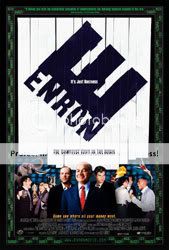SolidSnakeMGS
Superhero
- Joined
- Feb 7, 2006
- Messages
- 5,589
- Reaction score
- 0
- Points
- 31
I didn't see a thread about docs in general, which surprises me, so here is one. I've always liked documentaries, but now I think is a great time for them because there is so much going on in the world, and I think people nowadays have a hunger for entertainment that also educates and enlightens, which is one of the reasons for the boom of the documentary.
I've seen many docs, but these 4 are the most recent ones I've seen.
So please share your own views, reviews, and discussions about documentaries you've seen, want to see, or are looking forward to.
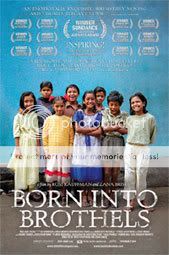
Born into Brothels (2004)
Written and directed by Zana Briski and Ross Kauffman
This documentary looks into the life of English documentary photographer Zana Briski visiting the red light area of Calcutta, India, and her attempts to help the children with their impoverished lives by providing them with a camera and basic education about photography. The kids' mothers are prostitutes, and most likely the female children will one day become one as well. The photographer then attempts with little success to get the children into schools. The children endure verbal and physical abuse at the hands of their parents, and live among squalor and crime constantly. The documentary implies that the cameras the children use help them deal with their lives a little better, as they are given a creative outlet by which to portray their own worlds through their eyes via photographs. The strength of the documentary are the kids themselves whom, despite their terrible lives, seem as upbeat and full of life as an kid. This is reinforced by letting us to a limited extent get to know the kids and their situation, and their photos are shown and we can see each one has their own photography style and preference. It's a sad and happy documentary, as it is heartbreaking to see how the kids live and the inevitability of what they may become, but on the other hand, there is hope for the kids in the form of schools and their passion for photography will bring a smile to your face. There is a debate whether or not the children's lives were improved as a result, but this documentary acknowledges that to a degree. There is a roughness to the look and feel of the documentary, as the locations are dingy and dirty alleyways and hovels that the people there call homes and at the same time the same places they commit their crimes in order to survive. But among the despair, it is the smiles of the children armed with cheap cameras that shine at us like a diamond in the rough.
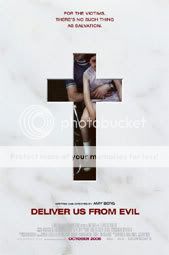
Deliver us From Evil (2006)
Written and directed Amy Berg
Easily one of the most heartbreaking documentaries I've seen, this one explores the sexual abuse of children -- even a 9 month old infant -- at the hands of Catholic clergyman as well as the cover-up by various churches including and up to the Vatican itself in order to hide the truth from the world. Its hard not to have a very strong opinion about this one, and even harder not to feel anger at a lot of people that many millions trust with faith. The documentary is well made, polished, with excellent cinematography throughout. It focuses on Catholic priest Oliver O'Grady, who molested many children (thought to exceed hundreds) from the late 70's to the early 90's. Church officials not only ignored and attempted to cover up the incidents, they continued to allow him to serve the church and be around children. On the other end, we see a handful of the victims today, and we can see their hurt as well as the hurt in some of the family members that are shown. The father of one of the victims is so filled with anger and hatred when he describes certain incidents, we get a sense he could be capable of killing despite his otherwise very gentle and humble nature. He can barely control his anger, and we as viewers share that. One doesn't want to see this documentary, but one must push on through the vileness that O'Grady seems to harbor with a casual reluctance. He is the smiling, laughing monster that doesn't see his actions as all too bad, but we wouldn't know it had we not known of his past monstrosities. More tragically, he lives nearly carefree in Ireland, having served only 7 years for his crimes while his victims still suffer today.
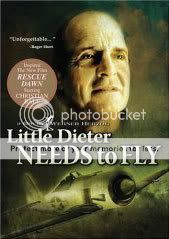
Little Dieter Needs to Fly (1997)
Written and directed by Werner Herzog
A German Air Force pilot is shot down over Vietnam during the war, and for months must endure torture and threat of death at the hands of his brutal Vietnamese captors. The documentary relies mostly on interviews with the present day Dieter Dengler himself (at the time of the documentary; he passed and was buried with honors in 2001), as he relays his terrible stories and -- amazingly -- nearly without a hint of any signs that he suffers from emotional trauma. He would eventually escape, refusing to accept the fate of some of the soldiers that had been in capture for years. There is some stock footage to provide context, and in an interesting move by the filmmaker, Dieter goes back to Vietnam and rudimentarily recreates some of the things he endured while captured, including enlisting the aid of Vietnamese locals decked out in what they would have worn -- including the iconic AK-47 -- back during the war. Herzog has a casual way of shooting this documentary. It isn't as polished as some of the better made documentaries, but that's fine because we are lead through by the enigmatic and likable Dieter, who while exhibiting some obvious and understandable behavioral side effects from his capture (such as stockpiling hundreds of pounds of food beneath his house and opening and closing doors frequently because to him, that represents choice and freedom, something he didn't know during those months of capture), doesn't seem to harbor any anger at his aggressors nor even shows barely any negative feeling towards what happened while relaying the events. Since this is a documentary about one man and events that happened a while back, there isn't much visual strength because we are being told a story by one man, but that doesn't diminish the power of the events and the ordeal the man had to go through. While in Vietnam, we see some beauty in the form of jungles and rivers, but they are not glorified for the camera. Herzog would go on to make a feature film of this, entitled "Rescue Dawn".
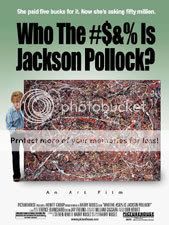
Who the #$&% is Jackson Pollack (2006)
Written and directed by Harry Moses
Documentaries about average Joes going up against people or organizations much larger than they are pretty common. Michael Moore has made that his MO in most of his documentaries (if they can be called that, but I digress). The title of this documentary comes from what the main character, a fiery-spirited elderly lady that drives trucks for a living, said when someone told her that the painting she paid $5 for at a thrift store may be the work of one of the most famous painters of modern times. We then see the obsession of the woman grows as she begins a quest to discover if she truly possesses a piece of work by an artist that has had art sold for hundreds of millions of dollars. We see art experts, researchers, and various other people, and its amazing how large the scope of this quest becomes as more and more people become involved. We also see the snobby side of the art world, with one very irritating and annoyingly flamboyant "art expert" who cannot, despite evidence otherwise, except the fact that some foul-mouthed, middle America woman may possess a piece of art by a legend. Hearing him go on and on about how right he is and how much of an expert he is and how there is no way she can possess a Jackson Pollack painting makes you want to reach out and strangle the elitist jerk. The fact that we see a lot of him despite his near uselessness makes me feel the filmmakers wanted to really nail the point of how close-minded elitism can be. A forensic expert comes in and does a lot of work, including taking samples from Pollock's studio itself. He is convinced the painting is real as he accumulates matching paint samples and even finds a matching fingerprint. The experts, including someone who knew the really Pollack, say otherwise. As the documentary ends, we are never sure or told whether the painting is authentic or not; just as in life, it isn't so much about what we achieve -- or fail to -- but the journey getting there. This is a fascinating look into the journey of a woman's quest to find answers, and it shows a lot about human behavior.
I've seen many docs, but these 4 are the most recent ones I've seen.
So please share your own views, reviews, and discussions about documentaries you've seen, want to see, or are looking forward to.

Born into Brothels (2004)
Written and directed by Zana Briski and Ross Kauffman
This documentary looks into the life of English documentary photographer Zana Briski visiting the red light area of Calcutta, India, and her attempts to help the children with their impoverished lives by providing them with a camera and basic education about photography. The kids' mothers are prostitutes, and most likely the female children will one day become one as well. The photographer then attempts with little success to get the children into schools. The children endure verbal and physical abuse at the hands of their parents, and live among squalor and crime constantly. The documentary implies that the cameras the children use help them deal with their lives a little better, as they are given a creative outlet by which to portray their own worlds through their eyes via photographs. The strength of the documentary are the kids themselves whom, despite their terrible lives, seem as upbeat and full of life as an kid. This is reinforced by letting us to a limited extent get to know the kids and their situation, and their photos are shown and we can see each one has their own photography style and preference. It's a sad and happy documentary, as it is heartbreaking to see how the kids live and the inevitability of what they may become, but on the other hand, there is hope for the kids in the form of schools and their passion for photography will bring a smile to your face. There is a debate whether or not the children's lives were improved as a result, but this documentary acknowledges that to a degree. There is a roughness to the look and feel of the documentary, as the locations are dingy and dirty alleyways and hovels that the people there call homes and at the same time the same places they commit their crimes in order to survive. But among the despair, it is the smiles of the children armed with cheap cameras that shine at us like a diamond in the rough.

Deliver us From Evil (2006)
Written and directed Amy Berg
Easily one of the most heartbreaking documentaries I've seen, this one explores the sexual abuse of children -- even a 9 month old infant -- at the hands of Catholic clergyman as well as the cover-up by various churches including and up to the Vatican itself in order to hide the truth from the world. Its hard not to have a very strong opinion about this one, and even harder not to feel anger at a lot of people that many millions trust with faith. The documentary is well made, polished, with excellent cinematography throughout. It focuses on Catholic priest Oliver O'Grady, who molested many children (thought to exceed hundreds) from the late 70's to the early 90's. Church officials not only ignored and attempted to cover up the incidents, they continued to allow him to serve the church and be around children. On the other end, we see a handful of the victims today, and we can see their hurt as well as the hurt in some of the family members that are shown. The father of one of the victims is so filled with anger and hatred when he describes certain incidents, we get a sense he could be capable of killing despite his otherwise very gentle and humble nature. He can barely control his anger, and we as viewers share that. One doesn't want to see this documentary, but one must push on through the vileness that O'Grady seems to harbor with a casual reluctance. He is the smiling, laughing monster that doesn't see his actions as all too bad, but we wouldn't know it had we not known of his past monstrosities. More tragically, he lives nearly carefree in Ireland, having served only 7 years for his crimes while his victims still suffer today.

Little Dieter Needs to Fly (1997)
Written and directed by Werner Herzog
A German Air Force pilot is shot down over Vietnam during the war, and for months must endure torture and threat of death at the hands of his brutal Vietnamese captors. The documentary relies mostly on interviews with the present day Dieter Dengler himself (at the time of the documentary; he passed and was buried with honors in 2001), as he relays his terrible stories and -- amazingly -- nearly without a hint of any signs that he suffers from emotional trauma. He would eventually escape, refusing to accept the fate of some of the soldiers that had been in capture for years. There is some stock footage to provide context, and in an interesting move by the filmmaker, Dieter goes back to Vietnam and rudimentarily recreates some of the things he endured while captured, including enlisting the aid of Vietnamese locals decked out in what they would have worn -- including the iconic AK-47 -- back during the war. Herzog has a casual way of shooting this documentary. It isn't as polished as some of the better made documentaries, but that's fine because we are lead through by the enigmatic and likable Dieter, who while exhibiting some obvious and understandable behavioral side effects from his capture (such as stockpiling hundreds of pounds of food beneath his house and opening and closing doors frequently because to him, that represents choice and freedom, something he didn't know during those months of capture), doesn't seem to harbor any anger at his aggressors nor even shows barely any negative feeling towards what happened while relaying the events. Since this is a documentary about one man and events that happened a while back, there isn't much visual strength because we are being told a story by one man, but that doesn't diminish the power of the events and the ordeal the man had to go through. While in Vietnam, we see some beauty in the form of jungles and rivers, but they are not glorified for the camera. Herzog would go on to make a feature film of this, entitled "Rescue Dawn".

Who the #$&% is Jackson Pollack (2006)
Written and directed by Harry Moses
Documentaries about average Joes going up against people or organizations much larger than they are pretty common. Michael Moore has made that his MO in most of his documentaries (if they can be called that, but I digress). The title of this documentary comes from what the main character, a fiery-spirited elderly lady that drives trucks for a living, said when someone told her that the painting she paid $5 for at a thrift store may be the work of one of the most famous painters of modern times. We then see the obsession of the woman grows as she begins a quest to discover if she truly possesses a piece of work by an artist that has had art sold for hundreds of millions of dollars. We see art experts, researchers, and various other people, and its amazing how large the scope of this quest becomes as more and more people become involved. We also see the snobby side of the art world, with one very irritating and annoyingly flamboyant "art expert" who cannot, despite evidence otherwise, except the fact that some foul-mouthed, middle America woman may possess a piece of art by a legend. Hearing him go on and on about how right he is and how much of an expert he is and how there is no way she can possess a Jackson Pollack painting makes you want to reach out and strangle the elitist jerk. The fact that we see a lot of him despite his near uselessness makes me feel the filmmakers wanted to really nail the point of how close-minded elitism can be. A forensic expert comes in and does a lot of work, including taking samples from Pollock's studio itself. He is convinced the painting is real as he accumulates matching paint samples and even finds a matching fingerprint. The experts, including someone who knew the really Pollack, say otherwise. As the documentary ends, we are never sure or told whether the painting is authentic or not; just as in life, it isn't so much about what we achieve -- or fail to -- but the journey getting there. This is a fascinating look into the journey of a woman's quest to find answers, and it shows a lot about human behavior.


